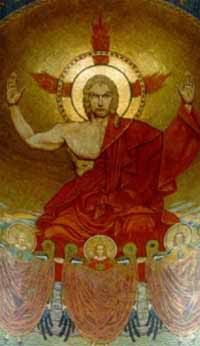Coming Home! is never easy, but it could be new life.

Being Anglo-Catholics, we did not have some of the historical and biblical problems facing many fundamentalists and evangelicals. Still, we had several objections that needed to be overcome. Above all, we had to understand the nature of the Church and its authority. Once you come to grip with that reality, which rests on both history and Scripture, the rest slides into place.
The quantity of the resource materials available to help potential converts is astonishing. First-rate books, magazines, tapes, and videos abound, and we dove deeply into them. The offerings of Ignatius Press are particularly rich. Catholic web sites on the Internet are consistently helpful and fascinating. I know of no church that can begin to match the literature and media available to Catholics.
Kathie and I also had to find a parish that offered at least a substantial measure of dignity and reverence. That was not easy around here, and I wrote a description in Adoremus of my first failed attempt. But we were soon able to locate a few suitable churches, and Opus Dei kindly opened its doors.
Milwaukee is still suffering the legacy of gone Rembert Weakland.
We were brought into the Catholic Church on July 31. It is a grand experience to be in communion with John Paul II and Cardinal Ratzinger, and to have one’s life guided by The Catholic Catechism. It is equally wonderful to be part of the same Church that nurtured the many splendid Christians who helped us into the barque of Peter. We will always be grateful.
And what kind of help did they get?
During an interview early this year with a local Catholic writer about The Empty Church, I expressed my frustration at being unable to find a way into the Catholic Church. He printed the story in the Archdiocesan paper and alerted Our Sunday Visitor. Both articles stirred an avalanche of support that was remarkable to behold and that led directly to our entrance into the fullness of the faith.
Books were mailed and left off at my office, phone calls came in, E-mail letters poured into my computer, local clergy called and visited. (The last of our Episcopal parish priests to visit our home came in 1977.) We were astonished to realize that scores of people from all over the country were interested in helping us to become Catholics. Scott Hahn and Thomas Howard telephoned. Catholic Answers and The Coming Home Network provided invaluable assistance. A few people--a priest in New York, a retired professor in Delaware, an activist in St. Louis, a convert in Minnesota, an ex-Episcopal priest in Northern Illinois, a writer in Pittsburgh--contacted us regularly through E-mail with assurances and explanations. A fine young priest in Kenosha offered his services, as did an Opus Dei priest from Milwaukee.
An Anglo-Catholic Comes Home
by Thomas C. Reeves
In The Empty Church: The Suicide of Liberal Christianity
(Free Press, 1996),
I argued that the “Seven Sisters” of liberal Protestantism deserved the continued loyalty and concern of their members. These venerable denominations, which included my own Episcopal Church, had a long history of good works and fidelity to the Gospel. They were now in the grasp of liberals, I showed, and were suffering from the inevitable illness that debilitates Christianity when it is watered down and made to conform to the world. Every effort should be made, I wrote, to preserve our religious homes from decay and eventual death, and I detailed several recommendations based on personal experience and a broad array of relevant literature.
The book was published in October, and within six months my wife and I were preparing to leave the Episcopal Church. Dale Vree of the New Oxford Review predicted in his review of The Empty Church that liberals would neither read the book nor take its suggestions to heart. By the spring of this year it was obvious that the prediction was true and that the Episcopal Church in particular was heading rapidly into the chasm that separates Christians from non-Christians.




0 Comments:
Post a Comment
<< Home